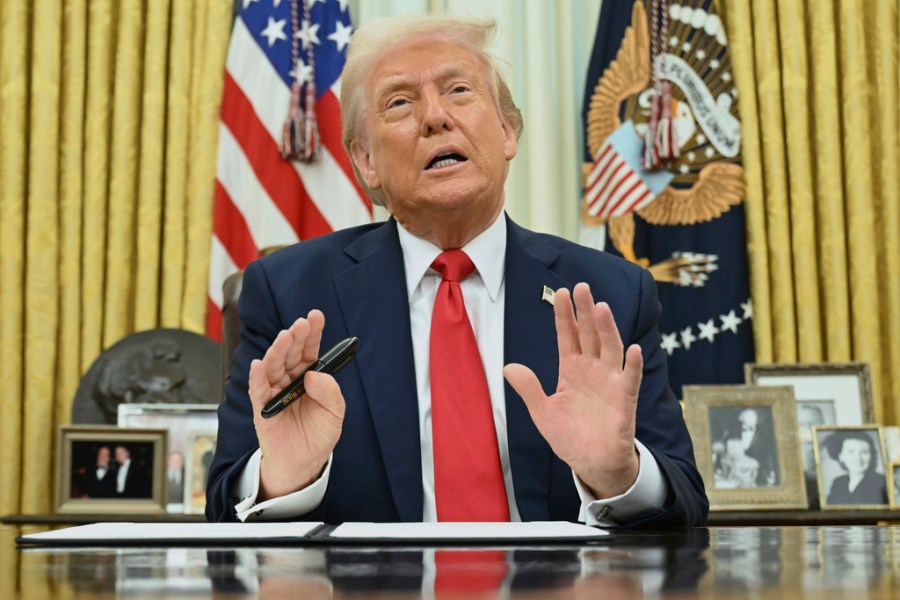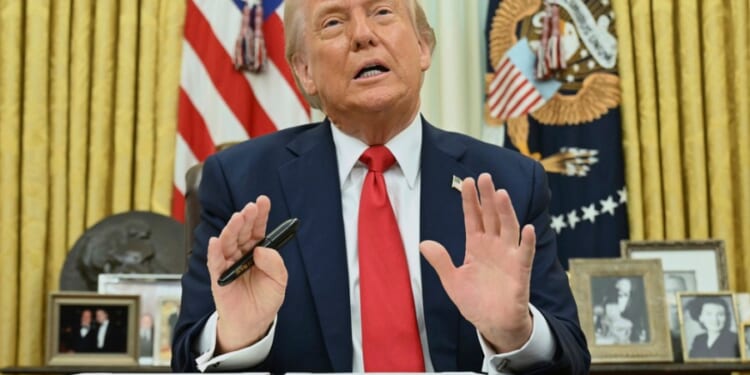
Given that April 15 is near, it’s a good time to consider President Trump’s proposal for replacing the Internal Revenue Service with an External Revenue Service.
A Trump executive order has tasked the secretaries of the Treasury, Commerce and Homeland Security with investigating “the feasibility of establishing and recommend the best methods for designing, building, and implementing an External Revenue Service (ERS) to collect tariffs, duties, and other foreign trade-related revenues.” As the president stated in his inaugural address, “Instead of taxing our citizens to enrich other countries, we will tariff and tax foreign countries to enrich our citizens.”
In his first term in office, Trump boasted in a tweet, “Billions of Dollars are pouring into the coffers of the U.S.A. because of the Tariffs being charged to China, and there is a long way to go.” The statement is at best misinformed, at worst laughable. The government did indeed collect tariffs, but they came from Americans, not China.
Trump is implying, whether seriously or not, that we could eliminate the individual income tax — and perhaps the corporate income tax — and replace that revenue with tariffs. The problem is the U.S. doesn’t collect anywhere near enough revenue from tariffs to offset the income tax.
According to the Congressional Research Service, “Over the past 70 years, tariffs have never accounted for much more than 2% of total federal revenue.” Tariffs brought in only $77 billion, or 1.57 percent of total revenue, in 2024. More importantly, that’s only 1.14 percent of that year’s $6.75 trillion in spending.
By contrast, federal revenue from the individual income tax was $2.43 trillion in 2024 — about 32 times the $77 billion the government received in tariffs. Including corporate income tax revenue of $0.53 trillion means the government received nearly $3 trillion for both income taxes.
Roughly 70 percent of products enter the U.S. duty free. Imposing tariffs on everything, even at higher rates, might net a few hundred billion dollars, but not $2.4 trillion.
And, importantly, it would still be U.S. companies and individuals paying those tariffs, not “foreign nations” as Trump suggests. As the Tax Foundation explains, “When the US imposes tariffs on imports, US businesses directly pay import taxes to the US government on their purchases from abroad.”
Let me reemphasize that: U.S. businesses, not the foreign country exporting the products, pay the import tariffs to the government. Trump’s tariffs are a tax on Americans, not foreign countries.
Trump has some good economists advising him who have surely told him who pays the tariffs. And some business leaders have reportedly explained it to the president. Whether the president can’t remember the truth or is willfully repeating a falsehood is a mystery.
Since Americans pay both income taxes and tariffs, it’s not clear how switching from the IRS, which collects income taxes from Americans, to the ERS, which would collect tariffs from Americans, would benefit U.S. taxpayers.
Of course, when significant new taxes are imposed — and a 25 percent tariff is significant — businesses and individuals will often spend time and money to legally, and sometimes illegally, minimize, avoid or evade the taxes. Thus, the new tariffs will only increase cost and inefficiency and, potentially, corruption.
But there are other problems with Trump’s ERS proposal. It’s true that tariffs were the primary source of federal revenue prior to passage of the federal income tax in 1913. But in modern times tariffs have been imposed not so much as a revenue enhancer but as a tool to protect certain favored U.S. industries against what are alleged as unfair trade practices. Trump embraces this notion, claiming tariffs will save U.S. jobs.
But there is an inherent contradiction in Trump’s approach. If tariffs reduce trade thereby protecting U.S. companies, the revenue from tariffs would add little to government coffers.
If the tariffs fail to reduce foreign imports, the government would collect more tariff revenue (from Americans), but then the tariffs wouldn’t be saving the U.S. jobs Trump claims he wants to protect.
And even if Trump were to replace the federal income tax with tariffs, there’s still other “internal” taxes for the IRS to monitor and collect — e.g., the estate and gift tax, excise taxes and the Social Security and Medicare payroll taxes.
The irony in Trump’s proposed External Revenue Service is that the revenue wouldn’t be “external” at all. It would be internal because U.S. companies and individuals would pay the tax. And the more successful the tariffs are in protecting U.S. companies from foreign competition, the less revenue the tariffs would raise to fund the government.
Merrill Matthews is a public policy and political analyst and the co-author of “On the Edge: America Faces the Entitlements Cliff.” Follow him on X@MerrillMatthews.











